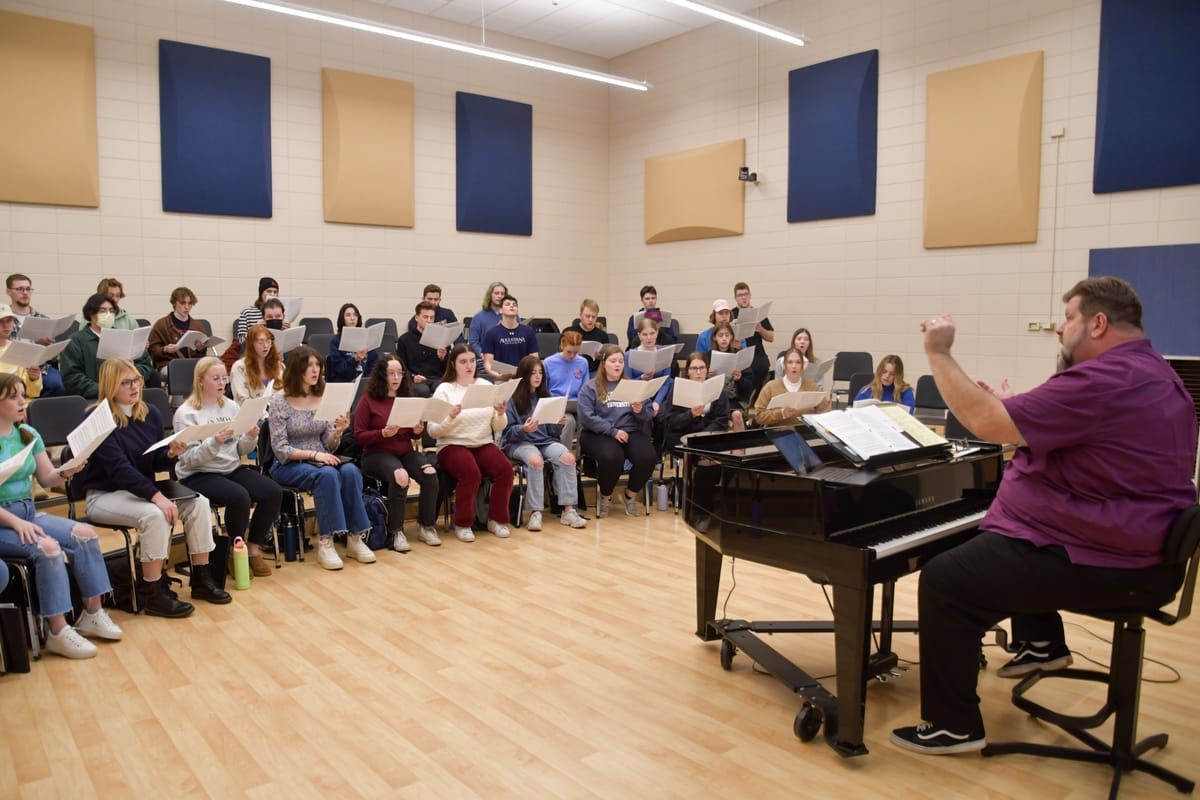School of Music prepares for the future

Program will grow to four choral ensembles next academic year
The Augustana School of Music is set to add two new choral groups this fall that will incorporate a more modern perspective, School of Music faculty say.
The School of Music currently features three choirs: Angelus, Augustana Choir and Chamber Choir. Next academic year, there will be four choirs, with the Chamber Choir becoming the Augustana Bach Collegium, a cantata-focused group, and VikingKOR, a tenor bass ensemble.
According to Director of Vocal Studies Russell Svenningsen, expanding the School of Music to include four choirs will round out the vocal opportunities it offers. Angelus consists of soprano and alto singers, and the addition of VikingKOR will provide an ensemble space for tenor and bass singers.
“As the terrain upon which academia functions shifts, so too must we adapt so that our students receive an education focused on their future rather than our past,” Svenningsen said.
According to Augustana’s website, the Augustana Choir joined the university in 1921 with goals to “‘serve God, the Church and our school’ through choral music.””
A “Ladies Choir” took the Vesper’s stage in 1944, according to Greg Alan Handel’s dissertation “The Augustana College Department of Music, 1921-1973: a history,” and the Chamber Choir first performed in 1993, according to past choir programs housed in the Center for Western Studies.
Sophomore Ben Burbach, a tenor in the Augustana Choir, said he is unsure about the upcoming changes to the choir programs but remains optimistic.
“Personally, I think it is going to be very different, but I think it will be for the students’ and faculty’s benefit,” Burbach said.
Svenningsen said the Augustana Choir currently has 56 students enrolled. The Chamber Choir has 22 students, including instrumentalists and Angelus has 38 students. Next academic year, the Augustana Choir will be slightly smaller, and VikingKOR will have about 20-25 singers.
“This change will allow us to present more varied types of music,” Svenningsen said.
According to Svenningsen, the expansion to four choirs will also allow the School of Music more time to focus on training students to develop technique and musicality outside mixed ensembles.
“The purpose of restructuring is to provide students with a higher level of education as they prepare themselves for the professional world,” David Chin, visiting music professor, said.
Svenningsen will lead VikingKOR and Augustana Choir. Voice Instructor Natalie Campbell will remain Angelus’ director and Chin will direct the new Augustana Bach Collegium, teaching students cantatas — musical pieces written by Johann Sebastian Bach for Lutheran church services in the 18th century.
Cantatas generally last between 25-30 minutes and include both singers and instrumentalists. Chin said the repertoire of cantatas is “highly relatable,” as they deal with matters such as hope, love and everlasting life.
“It’s highly devotional and spiritual,” Chin said. “I think this is a great addition to the School of Music and, also, the vocal department, which is really quite exciting. We don’t hear cantatas performed much in the Midwest.”
Chamber Choir members performed Bach for the time on March 22.
Not much will change for Angelus, though Campbell said the group has some exciting upcoming projects, such as a collaboration with the South Dakota Symphony Orchestra and Chorus. The groups will perform Gustav Mahler’s Symphony No. 3 together on April 27 at the Washington Pavillion for the last concert of Maestro Delta David Gier’s 20th season with the South Dakota Symphony Orchestra.
“Rehearsal time will be moved up an hour, but that’s fine with me,” sophomore Lily Wipf, an alto in Angelus, said.
Svenningsen said the changes to the choir program is part of a long-term plan born out of the 2020 creation of the School of Music.
“We are a School of Music now, so we’re balancing a lot of different things,” Svenningsen said. “The legacy of what a Lutheran choir has been, for many years, it has been a pretty large ensemble, a large mixed ensemble [with] 60 plus singers, and now that’s changing.”
Svenningsen said the School of Music is focusing on the future of the Lutheran choir tradition and how Augustana can transition it into the 21st century.
“So to create something that more effectively utilizes the students who are coming to participate in choral ensembles, it still provides them a very rich musical experience,” Svenningsen said. “The world has gotten smaller with regard to technology, and we have to figure out the best way forward for the Lutheran College choir.”
Returning students will audition for next year’s choir program at the end of May rather than the fall, and incoming students will audition in August. They will then be assigned to a choir, with the potential to participate in multiple choirs.
Svenningsen said the audition process will be similar to how the School of Music has conducted auditions in previous years. Students will start by singing the “Star-Spangled Banner.”
“It is a very difficult song to sing well because you can’t go into it not having practiced it,” Svenningsen said.
Next, Svenningsen said students will undergo a range check to show the highs and lows of their voices before performing an excerpt and doing some sight reading.
Wipf said she isn’t interested in joining either of the two new choirs but is excited to see how they turn out.
Burbach said he is, overall, excited for the expansion of the School of Music.
“I’m not exactly sure how it’s going to affect everything and everyone, but I hope that it doesn’t deter anyone from returning or joining the choirs,” Burbach said. “I personally am not a fan of change, but I’m excited to see what they have planned for us.”



